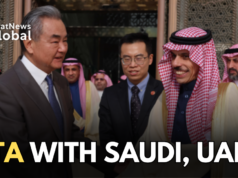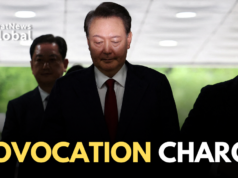North Korean officials wore pins with a portrait of Kim Jong Un in public for the first time in pictures released by state media on Sunday, the latest step in the development of a cult of personality about the leader.
North Korean officials, speaking at a key meeting chaired by Kim of the reclusive state’s ruling party, wore the typical party logo pin on the right lapel and, on the left chest, the pin with Kim’s face against a flag-shaped red background.
The 10th Plenary Meeting of the 8th Central Committee of the Workers’ Party of Korea, which reviews the party’s performance for the first half of the year, began on Friday, the state run Korean Central News Agency (KCNA) said.
The KCNA said five items on the agenda had been approved but it was not clear what those items were. It also said an important announcement would be made but there was no clarity on that either.
The Kim dynasty that has ruled North Korea since its founding after World War Two has sought to strengthen its grip on power by building cults of personality around itself.
In an apparent push to solidify Kim Jong Un’s status as a leader equal to his father and grandfather, North Korean media published photographs showing leader his portrait hanging prominently next to those of Kim Jong Il and national patriarch Kim Il Sung earlier this year.
In April, the music video for a propaganda song praising Kim Jong Un as a “friendly father” and a “great leader” was aired on the state controlled Korean Central Television, which has been banned by South Korea.
Less than two weeks ago, Kim hosted Russia’s President Putin in Pyongyang and revived an agreement dating back to the Cold War era on mutual military assistance if either were attacked.
Thirty eight years in journalism, widely travelled, history buff with a preference for Old Monk Rum. Current interest/focus spans China, Technology and Trade. Recent reads: Steven Colls Directorate S and Alexander Frater's Chasing the Monsoon. Netflix/Prime video junkie. Loves animal videos on Facebook. Reluctant tweeter.




